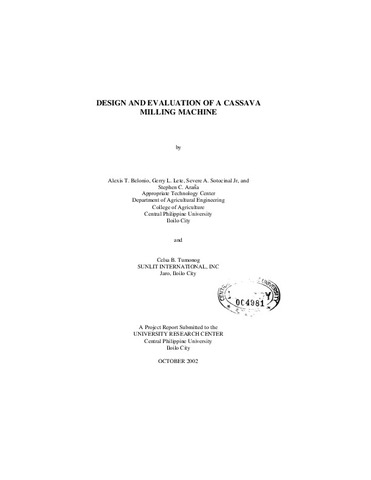Design and evaluation of a cassava milling machine
| dc.contributor.author | Lete, Gerry L. | |
| dc.contributor.author | Sotocinal, Severo A. Jr. | |
| dc.contributor.author | Araña, Stephen C. | |
| dc.contributor.author | Belonio, Alexis T. | |
| dc.contributor.author | Tumonog, Celsa B. | |
| dc.date.accessioned | 2021-04-23T03:25:27Z | |
| dc.date.available | 2021-04-23T03:25:27Z | |
| dc.date.issued | 2002-10 | |
| dc.identifier.citation | Belonio, A. T. , Lete, G. L. , Sotocinal, S. A. , Jr. , Araña, S. C. & Tumonog, C. B. (2002). Design and evaluation of a cassava milling machine (Research report). Jaro, Iloilo City: University Research Center, Central Philippine University. | en_US |
| dc.identifier.uri | https://hdl.handle.net/20.500.12852/792 | |
| dc.description | Abstract only | en_US |
| dc.description.abstract | Cassava is one of the most important crops being produced in Region VI, specifically in the province of Capiz. It is commonly used as food for people and as feed for livestock animals. Basically, matured cassava is harvested and processed by chipping and sold in the market in powdered form. However, for medium-scale processors, converting cassava to powder form is a common problem. In order to address the need of medium-scale processors for a machine that will powder cassava, the Appropriate Technology Center, Department of Agricultural Engineering, College of Agriculture, Central Philippine University, Iloilo City, in collaboration with SUNLIT International, Inc., Jaro, Iloilo City, designed and developed a cassava milling machine. This machine was fabricated and its performance was evaluated in the months of June to August, 2002. The cassava milling machine consists of the following: a feeding hopper where dried, chipped cassava is fed; a milling cylinder where chipped cassava were being powdered through the impact action of fixed hammers; a discharge hopper where powdered cassava is collected; a suction blower which moves the powdered cassava vi pneumatically to the collector; and a cyclone separator for separating powdered cassava from the air for bagging. Performance evaluation revealed that the throughput capacity of the milling machine has an average of 327.5 kg/hr for the first pass and 640 kg/hr for the second pass. The machine has a capacity per hammer of 16.4 and 32.0 kg/hr-hammer, for the first and second pass, respectively. Similarly, it has a specific capacity of 1056.4 and 2064.5 kg/hr-m2 for the first and the second pass, respectively. The fuel consumption rate of the 7.5-Hp gasoline engine used to drive the machine ranged from 1.6 to 1.9 liters/hour. The machine can be operated by one person only. The cassava milling machine can be fabricated using commonly available tools and equipment. It requires an investment cost of P43,000.00 per unit, including the engine. It has a total operating cost of P512.73 per day. At a milling capacity of 1 ton per day, the cost of operating the machine is P0.51 per kg. At 2 tons per day capacity, the operating cost is P0.26 per kg. Cost return analysis showed that for the local and the export markets, the payback periods are 41 and 183 days, respectively. Benefit cost ratio is 2.79 for the local market while 12.54 for the export market. The return on investment is 199.53 and 897.12 percent for the local and the export market, respectively. | en_US |
| dc.format.extent | vi, 27 leaves | en_US |
| dc.language.iso | en | en_US |
| dc.rights | Attribution-NonCommercial-NoDerivs 3.0 Philippines | * |
| dc.rights.uri | http://creativecommons.org/licenses/by-nc-nd/3.0/ph/ | * |
| dc.subject.lcc | GSl 630.72 B418 | en_US |
| dc.subject.lcsh | Cassava | en_US |
| dc.subject.lcsh | Milling machinery | en_US |
| dc.subject.lcsh | Cassava--Milling | en_US |
| dc.subject.lcsh | Milling machinery--Design and construction | en_US |
| dc.title | Design and evaluation of a cassava milling machine | en_US |
| dc.type | Technical Report | en_US |
| dcterms.accessRights | Limited public access | en_US |
| dc.description.bibliographicalreferences | Includes bibliographical references | en_US |
| local.subject.scientificname | Manihot esculenta | en_US |
이 항목의 파일
This item appears in the following Collection(s)
-
Research reports [167]
-
Research reports [37]



